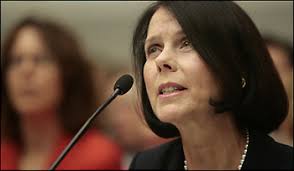Law Review Questions Expertise of Congressional Witness
Misstatements and Sloppy Use of Evidence Subject of New Publication
SANTA BARBARA, CA, – The Palm Center announced today that a Duke University law review is publishing a critique of a chief Congressional witness who is testifying at today’s hearings on the “don’t ask, don’t tell” policy on gays in the military. Aaron Belkin, director of the Palm Center, a research organization which studies gays in the military at the University of California, Santa Barbara, said the study is to appear in the forthcoming issue of the Duke Journal of Gender Law & Policy. The article, “The Importance of Objective Analysis: A Response to Elaine Donnelly’s Constructing the Co-Ed Military,” is a reply to a 2007 article by Elaine Donnelly in the same journal. Donnelly, who is president of the Center for Military Readiness, a traditional values interest group with no military or academic affiliation, is one of two witnesses testifying against the right of gays to serve at today’s hearings.
Donnelly’s testimony is largely drawn from her 2007 article, also published in the Duke Journal of Gender Law & Policy. The Palm Center study is a response to her article, which, according to Belkin, is riddled with mistakes and misreadings of both Palm Center work and the “don’t ask, don’t tell” law and policy that governs gay service.
“It’s unclear why Elaine Donnelly has a platform at all on this issue,” Belkin said. “She and her organization do no research and have no expertise on the matter.” Belkin noted, for example, that to bolster her point that the British military has been undermined by allowing gays and lesbians to serve openly, her article cites a single footnote which refers to five newspaper and radio stories, none of which have anything to do with gays in the military.
In Donnelly’s article and her written Congressional testimony, obtained by the Palm Center in advance of the hearings, Donnelly distinguishes between the 1993 Congressional statute forbidding open gays from serving and the “don’t ask, don’t tell” policy formulated by the Pentagon the same year, charging that the policy is “inconsistent with the law.” She argues that the Pentagon failed to legally implement the policy mandated by the Congressional statute, because the Pentagon policy allows gays to serve if closeted, while, she contends, the actual law is a full ban on gay service.
The Palm Center reply, co-authored by Belkin, two research colleagues at the Palm Center, and a demographer at the UCLA Law School’s Williams Institute, shows how Donnelly misreads the law. According to the law review article, she mistakes a “Sense of Congress” contained in the law for the law itself. “The section of 10 U.S.C § 654 that addresses the matter of asking recruits if they are gay or lesbian does not have the force of law, but is contained in a ‘Sense of Congress’ which is non-binding,” says the Palm Center article. “There is no basis from which to conclude that the policy is ‘inconsistent with the law,’ since the policy does nothing that is forbidden by the law, and there is nothing it fails to do that is mandated by the law.” Belkin explained that, “in the absence of any statutory requirement to ask recruits if they are gay, the Pentagon formulated a ‘don’t ask, don’t tell’ policy which ended questions about sexual orientation at the time of accession. Whatever you think of the “don’t ask, don’t tell” policy, it is fully consistent with the Congressional statute from 1993.”
Donnelly’s article is riddled with other errors, including misidentifying the Palm Center as a Berkeley organization, misreading the evidence on gay service during wartime and misunderstanding the statistical methodology of demographic data on the prevalence of gays in the U.S. military, as well as the research methods used in assessing polling data and the financial costs of the ban on open gays.
Belkin said the forthcoming Duke law review article details all these mistakes and corrects the record on research on gays in the military. Donnelly’s testimony in today’s hearings, the first held by Congress on this topic since 1993, repeats many of these errors, he said. “We welcome a serious dialogue on the research on gay service,” he said, “but Elaine Donnelly is not addressing this issue in light of the facts and evidence.” He suggested that she has adopted a political rhetoric that, without empirical evidence, posits a false tension between the rights of gays and the effectiveness of the military. “Her real concern is forwarding a traditional values agenda that has nothing to do with military readiness.” Her article, for instance, suggests that the integration of women into the military is one reason why American troops perpetrated the abuse at Abu Ghraib.
By contrast, Belkin said, researchers and military officers with experience serving in and studying the armed forces are increasingly viewing the ban on open gays as counterproductive. According to CNN and USA Today, over fifty retired U.S. Generals and Admirals recently signed a statement urging Congress to overturn “don’t ask, don’t tell.” And the Palm Center released a report earlier this month authored by a team of retired flag officers that called for the law to be repealed and “don’t ask, don’t tell” to end.
